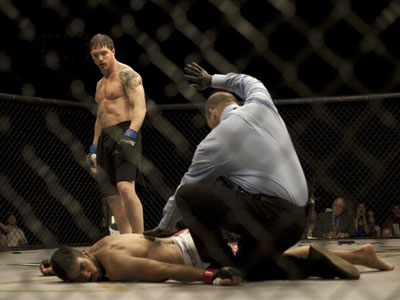
‘Well, at least that was quick, I’ve got the keynote to do in the morning.’
In The Usual Suspects, one character says that he doesn’t believe in God, but he’s afraid of him. Well, I don’t believe in God either, and I’m only afraid of two things: sharks, and commitment. So my biggest fear is getting married to a shark, and I won’t be doing that any time soon.
In general though, I think it’s healthy and productive to do things that scare you slightly. Why? Because I think that if you make a habit of intentionally stepping outside your comfort zone into situations that are weird and unnatural and where you’re not sure how you’re going to cope, you’ll fare much better when you accidentally get into (or are thrown into) one of those situations unintentionally. It’s training for life.
Along these lines, I recently agreed to give a presentation on social media to a roomful of doctors at the prestigious BASEM conference, and I can honestly say that I lost more sleep over it than I did my last cage fight. Yes, last cage fight. I’ve had three (amateur level), and that’s more than my lifetime tally of speeches (now standing at two). But, true to my prediction, there were commonalities between both disciplines. Here are my principles for both, with the disclaimer that I am still very much an amateur in both areas:
PLAN, THEN SIMPLIFY
In a cage fight: Professional fighters might study tapes of the opposition – at the amateur level, that isn’t an option, since you turn up on the day and fight whoever. So my gameplan for most fights (BJJ or MMA) is always fairly simple.
-Get on top somehow.
-If you end up on the bottom, get up.
-Once you’re on top, force the other guy to make a mistake. Don’t give up position. Tap him out.
This has gone wrong for me, but it’s gone right more often. It’s easy to remember, and easy to act on.
In a speech: Acting on various recommendations, I put together some notes, then wrote out my whole speech verbatim, tweaking the flow as I went (100 words per minute is a good guideline if you’re new to public speaking). Then I mercilessly hacked that down to a single easy-reference page of notes reading ‘Understand > Remember > Do’, ‘Einstein Anecdote,’ ‘Cat Joke’ and so on. As in the fight, this gave me a plan to follow, alongside plenty of space to improvise. On the day, I even threw in a semi-improvised Jehovah’s Witness joke. It got a laugh.
PRACTICE LIKE YOU’LL PERFORM
In a cage fight: Though it’s actually there for safety reasons – to stop you falling out, basically – getting inside a cage for the first time is an intimidating experience, and not something you want to do for the first time in a fight. You also need to get used to fighting off the cage, using it to stop takedowns or get up, and so on. I made sure I got to practise in a cage before my fight.
In a speech: When I asked Tom Miles, a professional photographer of my acquaintance who does lecture tours, for advice, he gave me a gem that I’ve never seen elsewhere: check what kit will be there. Are you going to have a podium to stand behind? A remote for slides? Clip-on mic, handheld, or just shouting? If you’ve practised walking around and making expressive hand movements, how are you going to cope if your movement’s restricted? Make your run-throughs mirror the reality, and you’ll face less nerves on the day.
PREPARE PROPERLY
In a cage fight: This is simple, but not everyone does it. Pack everything you need for the fight (gloves, shorts, gumshield, groin guard, towel, warm-up sweats, etc) at least the night before – I’ve heard some fighters say that doing it two days before will help you get mentally into fight mode. Know how you’re going to get to the venue in plenty of time, and have a back-up plan in case that goes wrong. You don’t want to be the guy who turns up late, has no time for a warmup, and has to scrounge some unfamiliar shinguards off a stranger.
In a speech: It’s almost exactly the same. I packed everything and decided what I’d wear a day in advance, and planned to get there in plenty of time. I also brought a copy of my presentation on USB even though I’d emailed it to the organisers, because you never know.
GET TOTALLY PSYCHED
In a cage fight: I’ve found that the mindset that works for me is calm and collected, but ready to go. That means a last-minute think-through of my plan, followed by much the same warmup as I do before hard sparring in classes, followed by thinking of the music that gets me most hyped in the world – the closing bars of the theme from Street Fighter The Animated Movie. I don’t need to actually listen to it, which is handy in situations where headphones are detrimental – just thinking about it now makes my neck-hairs bristle.
In a speech: Much the same: a last-minute run through of the notes, a quick bounce on the spot, a small but vicious coffee, and that Street Fighter music again. Go get it, champ.
HOMEWORK: Arrange to do something that scares you. Caveat: it has to be something where you’re at least partly responsible for your own well-being, so going on rollercoasters and watching J-horrors is out: joining a martial arts class, signing up for dance lessons or doing an open mic night are all acceptable.
]]>